Internationally renowned contemporary music experts Nina Janßen-Deinzer and Lucas Fels will be giving a concerto for clarinet and violoncello.
The program will feature works by:
- Mark Andre
- Mathias Spahlinger
- Pascal Dusapin
- Peter Gahn
- Kaija Saariaho
Nina Janßen-Deinzer (born in 1972)
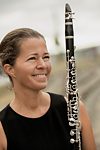 Photo: Nina Janßen-Deinzer
Photo: Nina Janßen-Deinzer
studied at Hans Deinzer’s school in Hanover, completing her studies with a concert exam. She won first prizes at German youth music competition “Jugend musiziert”, the German Music Competition, and the International Chamber Music Competition in Osaka/Japan. From 2006-2017, she was solo clarinetist of the Ensemble Modern. As a soloist, she has performed at renowned festivals such as the Salzburg Festival, the Salzburg biennale, the Donaueschinger Musiktage, the Ultraschall Berlin, the Festival NOW Essen, the Berlin Festwochen, and the Forum Festival Moscow as well as with orchestras such as SWR Baden-Baden and Freiburg, the hr Symphony Orchestra, the Deutsche Radiophilharmonie Saarbrücken, the Ensemble Modern Orchestra, the Konzerthausorchester Berlin, the Kremerata Baltica, and many more. Since 2015, she has been Professor of Chamber Music at the Hochschule für Musik Nürnberg. Since 2018, she has also been teaching contemporary music at the Hochschule für Musik Nürnberg.
Lucas Fels (born in 1962)
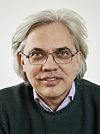 Photo: Bernhard Strauss
Photo: Bernhard Strauss
studied with Christoph Henkel in Freiburg, Anner Bijlsmain in Amsterdam, and Amadeo Baldovino in Fiesole. To date, he has played nearly a thousand world premieres and recorded more than 100 CDs featuring solo and chamber music of the 20th and 21st centuries. In 1985, he was co-initiator of the ensemble recherche in Freiburg, serving both as am executive board member and cellist until 2005. Since 2006, he has been the cellist of the Arditti String Quartet in London. Since 2013, he has been teaching New Music at the Hochschule für Musik und Darstellende Kunst in Frankfurt as chair for Interpretative Practice and Mediation. His master classes at colleges and universities are in high demand worldwide.
Composers
Pascal Dusapin
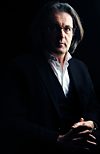 Photo: Durand Salabert
Photo: Durand Salabert
was born in 1955 in Nancy, France. During his studies of art history and aesthetics at the Université de Paris IV-Sorbonne, Dusapin initially learned the craft of composition in a rather autodidactical fashion, but later attended seminars with composers Olivier Messiaen and Iannis Xenakis. The latter became Dusapin’s “musical mentor” under whose influence he studied the mathematical and acoustic laws of music. Dusapin’s compositions include orchestral works, chamber music, and numerous operas. Pascal Dusapin draws his inspiration not only from literature, but also from theater, dance, and the fine arts. His interest in finding inspiration outside of the world of music is also evident in his many cross-genre collaborations. Dusapin, one of France’s most internationally active composers, has been awarded numerous prizes and honors.
Pascal Dusapin never joined a specific school, neither serialist nor spectralist. And yet, his music sounds unmistakably French in its sensuality and colorfulness. There is a certain elusiveness about it. Shimmering, fluctuating in constant motion and transformation, his sound is striking and magical. This is also true for his work Laps for clarinet and violoncello.
Mathias Spahlinger (born in 1944)
 Photo: Mathias Spahlinger
Photo: Mathias Spahlinger
is a German composer. His work occupies its own space amongst various musical influences and styles: between renaissance and jazz, between musique concrète and Weber-style minimalism, between sound, improvisation and notation, between aesthetic autonomy and political consciousness, Spahlinger’s works find ways to negotiate conflict for which there is no definite precedent. He was Professor of Composition and Director of the Institute for New Music at the Musikhochschule Freiburg.
Peter Gahn (born in 1970 in Münster/ Germany)
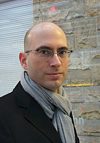 Photo: Peter Gahn
Photo: Peter Gahn
studied composition with Nicolaus A. Huber and Ludger Brümmer in Essen and with Jo Kondo in Tokyo. From 2000 to 2005, he taught at Japanese universities. Since then, he has been been working as a composer in Germany. Since 2015, he has been Professor of Composition/ New Media/ Sound Studies at the Musikhochschule Nürnberg. He has won numerous awards and scholarships. His works include chamber music and solo pieces as well as electroacoustic music. He likes to work across disciplines and often incorporates strong Asian references.
Kaija Saariaho (born in 1952 in Helsinki)
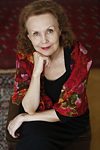 Photo: Maarit Kytöharju
Photo: Maarit Kytöharju
is a Finnish composer. She studied in Helsinki, Freiburg (with Brian Ferneyhough), and at the IRCAM in Paris, which she has called home for a long time. At IRCAM, she developed computer-assisted composition techniques, working with live electronics. This influenced her later compositions, which feature slow sound changes. She has won major composition awards: the Grawemeyer Prize, the Wihuri Prize, the Nemmers Prize, the Sonning Prize, the Polar Music Prize. Her oeuvre includes solo works, chamber music, large orchestral works, and many operas. She is considered one of the foremost composers in the world.
Mark Andre (born in 1964)
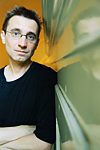 Photo: Manu Theobald
Photo: Manu Theobald
creates existential musical experience spaces that are marked by subtle processes of change. His musical mindset revolves around the topic of departure, referencing all musical parameters such as sound, form, and subject. His delicate, yet dense chamber music as well as his orchestral and musical theater works demonstrate the devout Protestant’s highly sensitive, analytical quest for sound.
After studying in France with Claude Ballif and Gérard Grisey at the Paris Conservatory, Mark Andre has found a new musical home in Germany. He speaks of a revelation when describes his encounter with the music of Helmut Lachenmann, which he discovered rather coincidentally as he stumbled over his piano concerto “Ausklang”. From 1993 to 1996, he studied composition with Lachenmann in Stuttgart and music electronics with André Richard in the SWR experimental studio. Soon thereafter, he started winning scholarships and awards; since 1998, he has regularly been teaching summer courses in Darmstadt. In 2002, he won the Young Artist’s Award by the Ernst von Siemens Music Foundation, and in 2005 participated in the DAAD Artists’ Program in Berlin, where he has lived ever since. He serves as Professor of Composition in Dresden.
| Program |
| Mark Andre |
iv 3 für Klarinette solo (2008) |
| Mark Andre |
E für Violoncello solo (2012) |
| Mathias Spahlinger |
still/moving (2015) für Klarinette und Violoncello |
| Pascal Dusapin |
Laps (1986/87) für Klarinette und Violoncello |
| Peter Gahn |
innere obere Ebene (2008/13) für Klarinette und Violoncello |
| Kaija Saariaho |
Oi Kuu (1990) für Bassklarinette und Violoncello |
Back